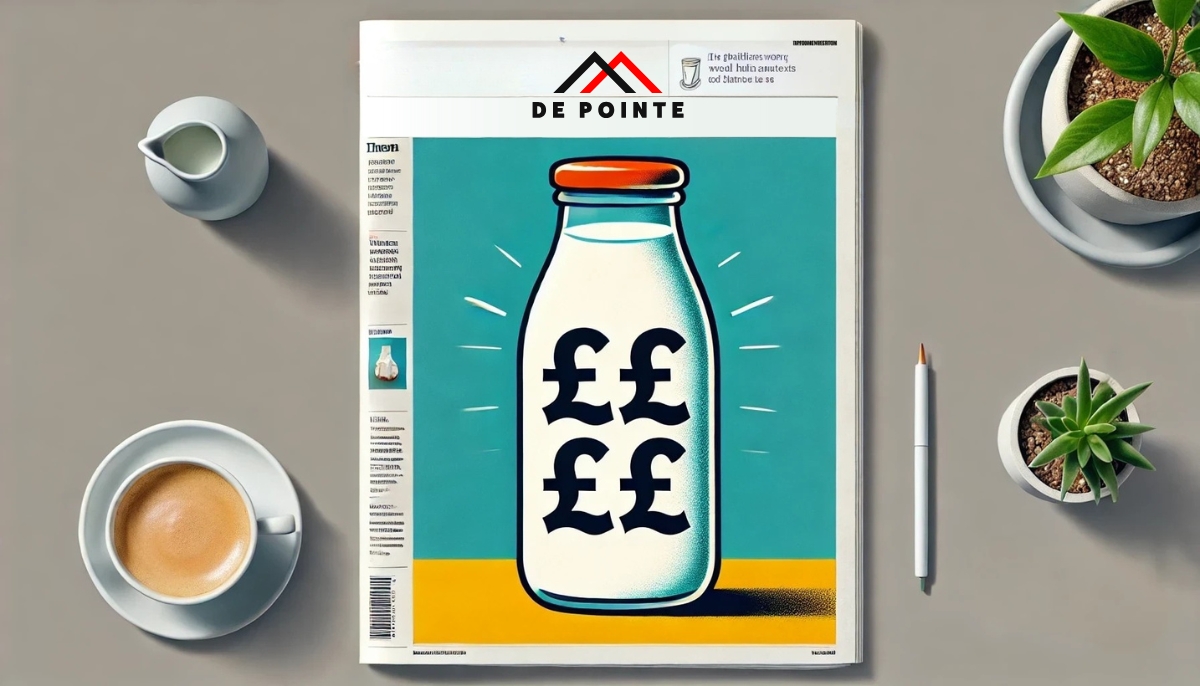Article

In recent weeks, Sainsbury’s milk price increase has triggered widespread outrage among UK shoppers. As one of the country’s largest supermarket chains, Sainsbury’s represents a critical part of the everyday shopping experience, and any rise in prices for common goods like milk will catch attention. This price hike isn’t an isolated incident; it is part of a broader inflationary trend affecting the cost of living across the UK and globally. But what does this mean for the average consumer, especially in terms of the erosion of cash savings? Understanding this is critical as inflation continues to impact household finances.
The Sainsbury’s Milk Price Increase: A Symptom of Bigger Problems
Milk, an everyday staple for millions of UK households, is just the latest product to see its price rise. Sainsbury’s has announced an increase in its milk prices, raising concern among consumers who are already facing rising food costs. While the price increase itself might seem modest — just a few pence more for each litre — it is a symbol of a much larger issue that is affecting the economy. From food products to fuel, utility bills to transportation, inflation is driving up the cost of living at an accelerating rate.
In fact, it’s not just Sainsbury’s; other supermarkets have followed suit, hiking prices on dairy products and other essential items. With rising costs squeezing budgets, it’s no wonder that consumers are feeling the pressure. But this price hike on milk is not just a short-term inconvenience — it is indicative of deeper, more systemic inflationary trends that will continue to impact our daily lives.
Inflation’s Hidden Impact on Cash Savings
While a Sainsbury’s milk price increase may seem like a small inconvenience on a grocery bill, it has a much larger economic context. As inflation increases, the value of money erodes, which directly impacts the purchasing power of consumers. If inflation is growing faster than the interest rates on your savings account, your money is losing value every day.
Take a look at an example: Let’s say inflation is running at 5%, but the interest rate on your savings account is only 1%. In this case, your savings are effectively losing 4% of their value each year. This means that even though your account balance may look steady, the real purchasing power of that balance is shrinking over time.
This erosion of value is especially concerning for those who rely on cash savings for long-term financial goals. While your savings account balance may not immediately change, the rising costs of goods — including the milk at Sainsbury’s — mean that the same amount of money will buy you less in the future. This is why inflation can be so insidious: it gradually wears away at your purchasing power without you even realizing it.
The Strain on Households
The effects of inflation are felt acutely in the household budget. As the price of milk and other groceries rise, many families are forced to adjust their spending habits. For some, this means cutting back on discretionary spending or seeking cheaper alternatives. But for others, inflation is driving them to look for ways to protect their wealth in the long term. With cash savings diminishing in value, many individuals are looking for alternative ways to safeguard their financial future.
Why Diversification is Key to Protecting Wealth
With inflation continuing to erode the value of cash savings, it becomes critical to look beyond traditional savings accounts. For those looking to preserve and grow their wealth, alternative assets offer a solution. Tangible assets like gold, art, and property have historically been seen as hedges against inflation. Unlike cash, these assets are less susceptible to rising inflation and tend to retain their value over time.
For example, gold has long been considered a safe haven amidst economic uncertainty. It has maintained its value through centuries of inflationary cycles and economic downturns. Likewise, art and other collectables have proven to be lucrative investments, often delivering returns that outperform traditional markets. These tangible assets offer a way to diversify your portfolio and protect your savings from the eroding effects of inflation.
At De Pointe Research, we emphasize the importance of investing in assets that are less vulnerable to inflation. Diversifying into tangible assets like gold or art not only provides a potential hedge against inflation but also allows investors to capture opportunities in markets that are not closely tied to the stock market. With inflation on the rise and the real value of cash savings declining, now is the time to think strategically about wealth preservation.
Inflation as an Opportunity for Smart Investors
Despite its challenges, inflation can also present opportunities for savvy investors. While rising prices make it more difficult for everyday consumers to make ends meet, they also create opportunities for those who are willing to invest wisely. By diversifying into alternative assets, investors can potentially earn returns that exceed inflation, preserving and growing their wealth over time.
For example, art investments have consistently outperformed traditional asset classes, with high-quality artworks delivering double-digit returns. Gold, too, has historically performed well during times of high inflation, making it a valuable asset in uncertain economic environments. These tangible investments are not just a way to protect against inflation; they are an opportunity to secure long-term growth and stability.
The Sainsbury’s milk price increase is more than just a headline — it is a reflection of the inflationary pressures that are taking a toll on households across the UK. As the price of everyday goods continues to rise, it’s important to consider how inflation is eroding the value of cash savings. By diversifying into alternative investments like gold and art, investors can protect their wealth from inflation’s corrosive effects and ensure that their savings continue to grow, even in uncertain times.
At De Pointe Research, we understand the importance of long-term financial security. That’s why we advise investors to allocate a portion of their portfolios to tangible assets that can help safeguard against inflation. Sainsbury’s milk price increase may be a small part of the picture, but it serves as a reminder that inflation is an ongoing challenge that requires proactive planning and smart investment strategies. With the right approach, you can protect your wealth and ensure that your savings continue to work for you.





